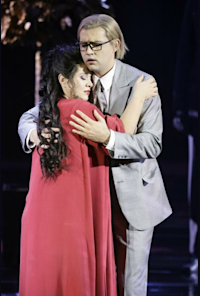Wolfgang Amadeus Mozart's opera Don Giovanni premiered on October 29, 1787 in Prague. The opera immediately gained incredible popularity and over the next few years was performed in Vienna, Leipzig, Frankfurt, Mannheim, Passau, Bonn, Warsaw, Hamburg, Brno, Berlin, Augsburg, Hannover ...
The libretto of the opera based on the medieval legend of the dissolute Seville aristocrat Don Juan Tenorio was written by Lorenzo Da Ponte, the author of the libretto of three of Mozart's most famous operas, including Don Giovanni. According to legend, Don Juan was executed by monks. The same monks spread the rumor that he had been cast into hell by a statue of the commander, the father of one of the women he had seduced. Based on this impressive history, many literary and musical works are known to have been created.
However, it was Mozart's Don Giovanni that became its most outstanding incarnation. The genre of this opera was unusual, in which comedy and tragedy, love affairs and murder, hedonism and mysticism were combined: “all the splendor of life and under it the abyss” (Georgy Chicherin). It is no coincidence that there are two finals in Don Juan. The first is tragic: the death of Don Juan, who falls into the burning hellish abyss. The second one is instructive and even cheerful, in which all the other heroes condemn the villain and discuss plans for the future.
The motives of the actions of the main characters are also ambiguous: Don Juan and Donna Anna. Some of them raise questions. So, we'll never know if there was or wasn't anything between them until their first appearance on stage. There are reasons for suspicion: Donna Anna several times with gentle persistence postpones the wedding with her named fiancé Don Ottavio ... And again: why does the famous lover, despite all his charm, fail to seduce a single woman throughout the action? Why, in the last minutes of his life, at the sight of the ghost of the Commander he killed, does he never come to repentance? Everyone who thinks about this story must answer these questions for himself.
The genius of Mozart's music and the ambiguity of the plot made his "Don Giovanni" a kind of "magic crystal" through which future generations saw themselves. While most of the classicist operas were forgotten, Don Giovanni "sounded" in the art of the romantics:
in the short story of the same name by E. T. A. Hoffmann, in the little tragedy (“The Stone Guest”) by Pushkin and the opera by Dargomyzhsky written on its basis, in Merimee’s mystical story “The Souls of Purgatory”. And in the most popular "Don Giovanni Serenade" by Tchaikovsky, written literally to the tune of Don Giovanni Serenade from the second act of Mozart's opera...
Don Juan appeared on the stage of the Bolshoi Theater in 1825 (three years later it was also presented in St. Petersburg). And since then, he has returned to the stage of the Bolshoi more often than any other opera from Mozart's heritage.
The performance, which is currently on the New Stage of the Bolshoi Theater, was produced by a production team, which included Tugan Sokhiev (stage director), Semyon Spivak (director), choreographer Sergei Gritsay, set designer Semyon Pastukh and costume designer Galina Solovyova.
In this production, the heroes of the legendary story belong to a society where an endless holiday reigns. Hedonism and an unbridled thirst for pleasure rule the ball. According to the director, his performance is not about a seducer, but about a man who lives by playing and, loving life, wants to get everything from it. And in this desire to live, he simply cannot stop in time. In the relationship of the characters there is no conscious cruelty, on the contrary, innocence and a kind of naive defenselessness are more likely to show through. They live a whole life, coming to the finale already in old age. And the transformation of Don Juan into an old man seems to awaken a child in him. All this contributes to the embodiment of the famous opera in the spirit of the theater of experience, with the naturalness of emotions and reactions, unusual for our time of radical directorial experiments.








